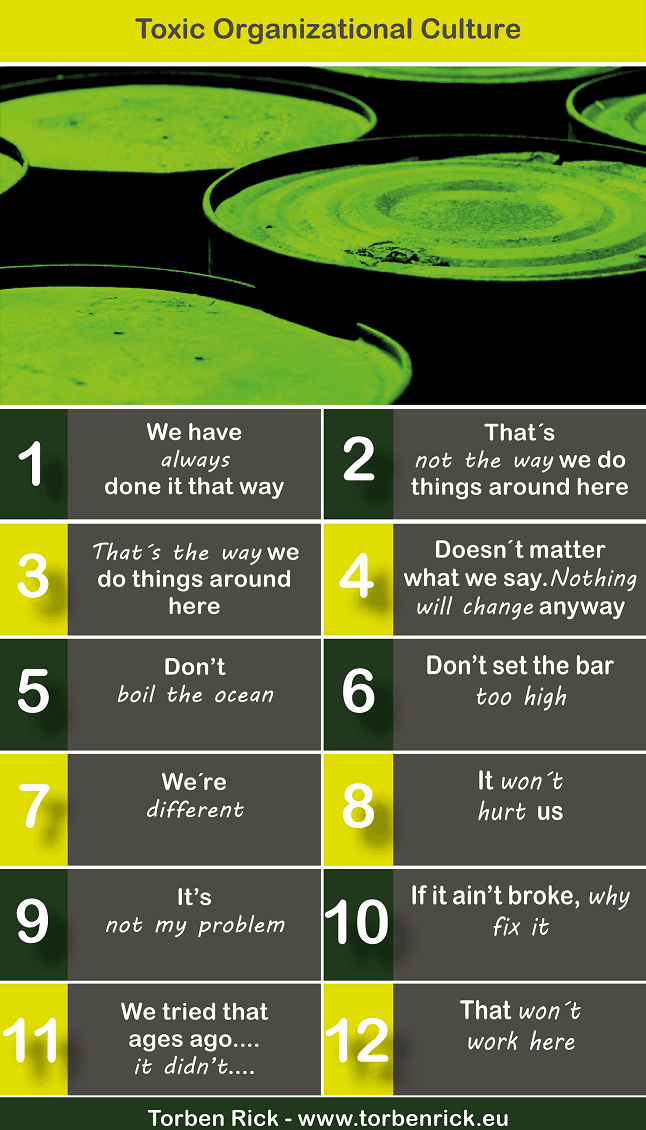Toxic organizational culture and business performance
Allowing your organizational culture to become polluted by toxicity is a death blow to your vision and strategy. How do you gauge if your culture is driving or damaging performance?
Watch out for these twelve surefire indicators of toxicity:

Short URL & Title:
Toxic organizational culture — https://www.torbenrick.eu/t/r/ajt
Share it:
If you enjoyed this article, please take 5 seconds to share it on your social network. Thanks!








Damn right – it is often the “small signs” that make the difference in the “field” (the broader view of the organization). It could be delays, once well served customers leaving, a choleric boss at top, workforce that talks about the real things in the coffee kitchen, but never open up in public conversation either with the boss or others, …..
Nothing is believed to be true until it is too late.
Hopefully the company has enough outliers, whistleblowers who don’t dare to mention the truth.
An excellent collection of “slogans” common for a lot of companies I met along my +38 years of career both in public and private sectors.
With your permission and mentioning the source, I shall use this table with students in my OB&L classes.
Thanks – Your welcome to do that. Have a nice WE
Great list, there is one item missing ….. Below par leadership …. a culture will be very toxic if the leader is needs to control, considers them to be the only capable person, has a tendency for negativity, gives feedback poorly
While these phrases might be said, it is what is not said that will hurt you. The worst thing a company can do is to RIF people, especially if it has not made a habit of it. Once that sense of belonging and respect has been broken you can not get it back and they will only pay lip service to change in the future – ‘what is in it for me’ – ‘does it make me safer?’ will rise above “what is best for all of us.” Those who shatter loyalty reap what they sew. Also fear which this generates stops people from being creative, from taking risks – you can not reach for the stars with your head down – we need better leaders just as Ian says but evidently according to latest Psychology research a lot of leaders are sociopaths – unable to feel for others but truly great leaders connect to their people at an emotional level and people will do anything for them – I have seen this happen in big and small companies – when it happens is when the old leaders retire and new blood comes in, wanting to make their mark – as the baby boomers finally retire this will grow even worse I feel unless we measure a companies success over the generations and not the next quarter.
Great piece Torben Rick, but I guess number 10 isn’t toxic! here let me past a little excerpt from an article.
” If It Ain’t Broke, Don’t Fix It:
Not all best practices would work in a given business situation or specific business sometime it’s far more effective to tweak things that are already being in use/utilized instead of going for something new, something different, rather sometimes it’s better to leave something as it is then to change it.
This very fact has been recognized by various researchers/academics, they found that certain QMP factors, such as management support, customer focus and process management, appeared to be effective in small service firms (specific business) without the need for detailed processes and systems (best practices).
Thus they suggest that it is therefore unnecessary for a company to adopt all quality management practices (best practices) to achieve good performance. (2).”
I guess that makes a lot of sense, I would like to hear your take on it and the rest are sure indicators as you put indicators of toxicity